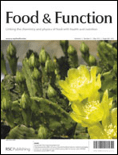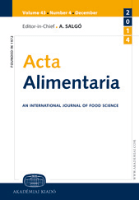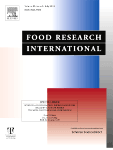
Food Frontiers
Scope & Guideline
Advancing Sustainable Solutions for a Global Challenge
Introduction
Aims and Scopes
- Nutritional Science and Health Effects:
The journal focuses on the nutritional aspects of foods, including their bioactive components and their effects on health, metabolism, and disease prevention. - Food Safety and Quality Control:
Research related to food safety, including detection of contaminants, foodborne pathogens, and the development of preservation methods to enhance the quality and safety of food products. - Functional Foods and Bioactive Compounds:
Exploring the role of functional foods and natural compounds in health promotion, disease management, and their mechanisms of action within the body. - Microbiota and Gut Health:
Investigating the interactions between diet, gut microbiota, and overall health, including the impact of dietary components on gut microbiota composition and function. - Food Processing and Technology:
Research on innovative food processing techniques and their effects on food properties, nutritional value, and safety, including the application of nanotechnology and other advanced methods. - Cultural and Societal Aspects of Food:
Examining the social, cultural, and economic factors influencing food choices, consumption patterns, and the acceptance of novel food sources.
Trending and Emerging
- Gut-Brain Axis and Microbiota Research:
There is an increasing focus on the gut-brain axis and the role of gut microbiota in influencing mental health, cognitive function, and overall well-being. - Functional Foods Targeting Specific Health Issues:
Emerging research is centered on developing functional foods that target specific health conditions, such as metabolic disorders, cardiovascular diseases, and cognitive decline. - Sustainable and Innovative Food Sources:
Research is trending towards exploring alternative food sources, including insects and plant-based foods, as sustainable options to meet global food demands. - Nanotechnology in Food Science:
The application of nanotechnology in food preservation, safety, and delivery systems is gaining traction, with several studies exploring its potential benefits. - Interdisciplinary Approaches to Food Research:
There is a growing trend towards interdisciplinary research that combines food science, nutrition, microbiology, and psychology to address complex health issues. - Personalized Nutrition and Dietetics:
Emerging themes in personalized nutrition, focusing on how individual variations in genetics and microbiota affect dietary needs and responses, are becoming increasingly relevant.
Declining or Waning
- Traditional Food Preservation Techniques:
Research focusing on conventional preservation methods is decreasing as newer technologies and approaches gain prominence in the field. - Basic Nutritional Studies:
Studies that primarily focus on basic nutritional composition without exploring functional or health-related implications are becoming less common, as there is a greater emphasis on applied research. - Single Food Component Studies:
Research focusing on the effects of single food components in isolation is waning in favor of more integrative approaches that consider complex food systems. - Animal Studies with Limited Human Relevance:
While animal studies remain important, there is a trend towards prioritizing research that has direct implications for human health, leading to a decrease in studies with limited translational value.
Similar Journals

Food & Function
Transforming Food Research for Better LivingFood & Function, published by the Royal Society of Chemistry, is a premier journal dedicated to advancing the understanding of food science and its intersection with health and nutrition. With an impressive impact factor and classified in the Q1 quartiles for both Food Science and Medicine (Miscellaneous) as of 2023, this journal stands at the forefront of research dissemination in its field. Established in 2010 and continuously evolving through to 2024, Food & Function presents a broad spectrum of innovative and impactful articles that explore the physiological effects of food components, nutritional science, and the functional properties of food. With a Scopus ranking in the 91st percentile for Agricultural and Biological Sciences, it serves as an invaluable resource for researchers, professionals, and students alike, seeking to explore the intricate relationship between diet and well-being.

International Food Research Journal
Elevating Food Science with Quality InsightsThe International Food Research Journal, published by UNIV PUTRA MALAYSIA PRESS, serves as a pivotal platform for disseminating innovative research within the field of food science. With an ISSN of 1985-4668 and an E-ISSN of 2231-7546, the journal has successfully established its presence since its inception in 2007, converging its findings through 2024. This esteemed journal holds a Q3 ranking in Food Science, illustrating its valuable contributions to the field as demonstrated by its Scopus rank of 276 out of 389, placing it in the 29th percentile among its peers in Agricultural and Biological Sciences. Although it operates under a traditional publishing model, its academic integrity and focus on high-quality research ensure that it remains a vital resource for researchers, professionals, and students eager to explore advances in food technology, nutrition, and safety. By encouraging interdisciplinary collaboration and critical dialogue, the International Food Research Journal plays an essential role in shaping the future of food science research.

eFood
Pioneering insights in food technology and nutrition.eFood is a pioneering journal in the field of food science, published by the esteemed WILEY. With its impactful emergence, the journal has rapidly established itself within the academic community, evidenced by its impressive Q1 category ranking in Food Science as of 2023, and a commendable position at Rank #95 out of 389 in the Scopus database. Covering a wide spectrum of topics related to food innovation, technology, safety, and nutrition, eFood serves as an indispensable platform for researchers, industry professionals, and students who are at the forefront of advancing our understanding of food systems. The journal notably operates with an open-access model, promoting wide dissemination of knowledge while enhancing the visibility of high-quality research. As we look forward to converging years from 2020 to 2024, eFood is poised to foster rigorous scientific discourse and contribute significantly to the future of food science research.

Ukrainian Food Journal
Nurturing a community dedicated to food innovation.Ukrainian Food Journal is an esteemed open-access journal dedicated to advancing the field of food science and biochemistry. Established in 2012 and published by the National University of Food Technologies in Ukraine, the journal serves as a vital platform for researchers and professionals to disseminate their findings on food technology, safety, and nutritional biochemistry. With an ISSN of 2304-974X and E-ISSN 2313-5891, it offers a wealth of knowledge to its readers, promoting innovation and collaboration within the industry. While currently categorized within the Q4 quartile of biochemistry and the Q3 quartile of food science, the journal is progressively gaining recognition, reflecting a commitment to quality research in a competitive field. The journal is indexed in Scopus, ranking #271 in Food Science and #376 in Biochemistry, underscoring its relevance and contribution to agricultural and biological sciences. The Ukrainian Food Journal not only enriches the academic community with its open-access model but also aims to foster dialogue among researchers, professionals, and students dedicated to improving food systems and nutrition. It operates from its headquarters in Kyiv, offering a hub for creativity and advancement in food-related research.

Functional Foods in Health and Disease
Unlocking the Potential of Functional Foods in Disease PreventionFunctional Foods in Health and Disease is a respected peer-reviewed journal published by FUNCTIONAL FOOD CENTER INC, dedicated to advancing research in the fields of biochemistry, food science, medicine, and nutrition. Since its inception in 2011, this journal has provided a platform for innovative studies that connect the impact of functional foods on health and disease outcomes. With a focus on interdisciplinary research, it aims to disseminate knowledge that enhances the understanding of how specific food components can influence health and well-being. The journal is indexed with an ISSN of 2160-3855 and annually ranked in several categories, including Q4 in Biochemistry and Q3 in Food Science, Medicine, and Nutrition and Dietetics for 2023. As an open access publication, it ensures that research is widely accessible, which is crucial for fostering collaboration and discussion within the scientific community. This journal is a vital resource for researchers, practitioners, and students seeking to explore the dynamic role of functional foods in health promotion and disease prevention.

ACTA ALIMENTARIA
Innovating food chemistry and nutrition for a sustainable world.ACTA ALIMENTARIA is a renowned journal in the field of food science, published by AKADEMIAI KIADO ZRT, based in Hungary. Since its inception in 1973, it has served as a vital platform for disseminating high-quality research on food chemistry, microbiology, nutrition, and technology, contributing significantly to the advancement of knowledge in the agricultural and biological sciences. Currently classified in the Q3 quartile of the 2023 Food Science category, the journal is positioned to address pressing issues pertaining to food safety, quality, and sustainability, making it an invaluable resource for researchers, professionals, and students alike. Although it does not currently offer open access, the journal maintains a strong reputation with a readership keenly interested in the latest developments in food science. With a Scopus rank placing it in the 38th percentile of its category, ACTA ALIMENTARIA continues to be a pivotal reference for those engaged in food research and innovation.

Applied Food Research
Advancing Food Science for a Sustainable FutureApplied Food Research, published by Elsevier, is an esteemed journal that plays a critical role in advancing the field of Food Science. With an ISSN of 2772-5022, the journal has established itself as a premier outlet for high-quality research, achieving a commendable Q1 ranking in the 2023 Food Science category and a 63rd percentile in Scopus rankings for Agricultural and Biological Sciences. Covering a diverse range of topics from food safety to innovative processing techniques, Applied Food Research seeks to publish pioneering studies that enhance our understanding of food systems and contribute to broader discussions on sustainability and nutrition. As it converges on its fourth year of publication, researchers, professionals, and students alike are encouraged to engage with its content through various open access options, ensuring widespread dissemination of knowledge in a field that is vital to global health and well-being. Operating out of Amsterdam, Netherlands, this journal is poised to be an indispensable resource for anyone dedicated to making significant contributions in the domain of food science.

Journal of Food Science and Technology-Ukraine
Bridging Theory and Practice in Food ScienceJournal of Food Science and Technology-Ukraine, published by the Odesa National University of Technology, stands as a pivotal platform dedicated to the dissemination of high-quality research in the field of food science and technology. With its open access policy established in 2014, the journal fosters global knowledge sharing and accessibility, enabling researchers, professionals, and students to access critical findings and advancements in food technology without barriers. The journal's commitment to publishing innovative studies, reviews, and case analyses reinforces its role in addressing contemporary challenges in food safety, preservation, processing, and nutritional quality. With ISSN 2073-8684 and E-ISSN 2409-7004, it serves as a valuable resource for the academic community, supporting the advancement of food science knowledge and its practical applications.

FOOD RESEARCH INTERNATIONAL
Fostering Collaboration for Food InnovationFOOD RESEARCH INTERNATIONAL is a premier academic journal published by ELSEVIER, specializing in the field of Food Science. With an impressive impact factor and ranked Q1 in the 2023 category quartiles, it stands at the forefront of research, positioned 17th out of 389 in the Scopus ranking for Agricultural and Biological Sciences, attaining a commendable 95th percentile. The journal publishes high-quality, peer-reviewed articles that cover a broad spectrum of topics, including food safety, quality control, nutrition, and biotechnology, making it an invaluable resource for academics, industry professionals, and students alike. As FOOD RESEARCH INTERNATIONAL seeks to enhance understanding and advance technologies related to food, it encourages innovative perspectives and interdisciplinary research. The journal, active from 1992 and continuing through 2024, is an essential platform for disseminating vital findings and fostering collaboration within the global food science community.

Foods is a premier open access journal published by MDPI, based in Switzerland, that has been at the forefront of disseminating high-quality research in the fields of food science, health professions, and plant science since its establishment in 2012. With an impressive convergence of interdisciplinary studies spanning various aspects of food, nutrition, and microbiology, the journal aims to provide a comprehensive platform for researchers and professionals to share innovative ideas and findings. Maintained as a Q1 journal in multiple categories for 2023, including Food Science and Health Professions, Foods has garnered significant recognition within the academic community, reflected in its strong Scopus rankings and percentiles across various disciplines. The journal not only promotes open access to enhance the visibility and accessibility of research but also encourages the exploration of sustainable food systems and health-related issues, thus contributing to essential discussions in today's society. For those looking to advance their understanding and expertise in food-related sciences, Foods serves as an enduring resource for groundbreaking studies and critical insights.